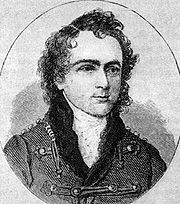
Jozsef Karman
Encyclopedia

Hungary
Hungary , officially the Republic of Hungary , is a landlocked country in Central Europe. It is situated in the Carpathian Basin and is bordered by Slovakia to the north, Ukraine and Romania to the east, Serbia and Croatia to the south, Slovenia to the southwest and Austria to the west. The...
author, was born at Losonc (today Lučenec in Slovakia
Slovakia
The Slovak Republic is a landlocked state in Central Europe. It has a population of over five million and an area of about . Slovakia is bordered by the Czech Republic and Austria to the west, Poland to the north, Ukraine to the east and Hungary to the south...
) in 1769, the son of a Calvinist pastor. He was educated at Losonc and Pest
Pest (city)
Pest is the eastern, mostly flat part of Budapest, Hungary, comprising about two thirds of the city's territory. It is divided from Buda, the other part of Budapest, by the Danube River. Among its most notable parts are the Inner City, including the Hungarian Parliament, Heroes' Square and...
, whence he migrated to Vienna
Vienna
Vienna is the capital and largest city of the Republic of Austria and one of the nine states of Austria. Vienna is Austria's primary city, with a population of about 1.723 million , and is by far the largest city in Austria, as well as its cultural, economic, and political centre...
. There he made the acquaintance of the beautiful and eccentric Countess Markovics, who was for a time his mistress, but she was not, as has often been supposed, the heroine of his famous novel Fanni hagyományai ("Fanny's testament"). Subsequently he settled in Pest as a lawyer.
His sensibility, social charm, liberal ideas (he was one of the earliest of the Magyar freemasons) and personal beauty opened the doors of the best houses to him. He was generally known as the Pest Alcibiades
Alcibiades
Alcibiades, son of Clinias, from the deme of Scambonidae , was a prominent Athenian statesman, orator, and general. He was the last famous member of his mother's aristocratic family, the Alcmaeonidae, which fell from prominence after the Peloponnesian War...
, and was especially at home in the salons of the Protestant magnates. In 1792, together with Count Ráday, he founded the first theatrical society at Buda
Buda
For detailed information see: History of Buda CastleBuda is the western part of the Hungarian capital Budapest on the west bank of the Danube. The name Buda takes its name from the name of Bleda the Hun ruler, whose name is also Buda in Hungarian.Buda comprises about one-third of Budapest's...
. He maintained that Pest, not Pozsony should be the literary center of Hungary, and in 1794 founded the first Hungarian quarterly, Urania, but it met with little support and ceased to exist in 1795, after three volumes had appeared. Kármán, who had long been suffering from an incurable disease, died in the same year.
The most important contribution to Urania was his sentimental novel, Fanni hagyományai, much in the style of La nouvelle Héloise and Sorrows of Young Werther, the most exquisite product of Hungarian prose in the 18th century and one of the finest psychological romances in the literature. Kármán also wrote two satire
Satire
Satire is primarily a literary genre or form, although in practice it can also be found in the graphic and performing arts. In satire, vices, follies, abuses, and shortcomings are held up to ridicule, ideally with the intent of shaming individuals, and society itself, into improvement...
s and fragments of an historical novel, while his literary program is set forth in his dissertation A nemzet csinosodása ("Beautification of the Nation").

